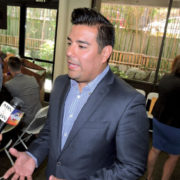LOS ANGELES — A proposed statewide law which seeks to provide health care coverage for California’s remaining uninsured could create new fees on remittances and driver’s license applications as a way of funding an expanded Medi-Cal and an insurance marketplace for the undocumented.
According to State Senator Ricardo Lara (D-Huntingon Park/Long Beach), the primary author of Senate Bill 1005 or the Health For All Act, the proposal of imposing these new fees are part of the ongoing discussion between proponents of the bill, Sacramento intelligentsia, and other think tanks who are all finding ways of making the Health For All a fiscally sound program.
For immigrants whose families back home rely heavily on remittances from the United States, these fees, particularly those levied on remittances, could be seen as a huge setback.
On a larger scale, the added fees on remittances could also adversely impact the economies of some countries whose Gross National Product numbers greatly depend on foreign remittances.
However, during an ethnic media roundtable discussion hosted by New America Media on Friday, Sept. 5, Lara clarified that the imposition of these fees are still theoretical at this point, and are not yet considered as the “ultimate solution” to make the Health For All program work.
“There’s no set fee now. We’re just in the discussion phase. We’re trying to figure out how much money we’re actually going to need to be able to fund this exchange and the expansion of Medi-Cal,” Lara said.
Lara, who is joined by a broad and diverse statewide coalition of health, immigrant and community advocates in the push for Health For All, said that it is “tricky” to figure out how much money this program is going to cost.
The State Senator emphasized that the proposed remittance fees are still only an idea at this point, and that there is “no set way” that it is in place for the program’s funding.
Lara also went on to say that a majority of polled California voters agreed that the added fees were a good idea.
“Again, we have to be very mindful and careful. Like you said, it upholds the the Philippine economy. Remittances in some of the Mexican states, that’s their number one economy too. So we have to be very careful. But we also have to figure out and be honest with ourselves on how we’re gonna get this paid for. It’s about finding that delicate balance,” Lara conceded.
“There’s no fee, there’s no discussion [that says the fees are] the one set way [to fund the program], but it is part of the conversation. I would be lying to you if [I said] it is not,” he added.
Relevance of ‘Health For All’
Lara introduced SB 1005 in February 2014. It will effectively extend eligibility for Medi-Cal benefits to low-income undocumented California immigrants who would qualify for the assistance, had it not been for their immigration status. The bill also proposes the creation of a statewide health benefit exchange program where all Californians, regardless of immigration status, can receive health care coverage.
In a statement issued after the bill’s introduction to the State Senate, Lara pointed out that the federal health care reform, the Affordable Care Act, specifically excluded undocumented immigrants from insurance coverage provided through the statewide health care exchange, Covered California.
In spite of the ACA being in place, it is projected that about three to four million people in California remain uninsured, and about one million of those are undocumented residents ineligible for coverage.
“Access to health care is the civil rights issue of our generation. We’ve heard time and time again that folks [without] access to health care clog up our emergency rooms. That only costs us millions of dollars, at no need, to our state budget,” Lara pointed out.
Health For All Act, Lara said, will save the state money in the long term. It will also allow California to have healthier communities, he said.
“When we say health care for all, we mean health care for all. Unfortunately, the federal government does not cover undocumented communities,” Lara said to Asian Journal.
As it stands now, a lot of families have mixed households, where some members have health insurance, and some don’t due to their immigration status.
“I think it’s fair for us to cover everyone and ensure that everybody has the ability to live a healthy life in California,” Lara said.
With California being considered as a trendsetter state in terms of progressive legislation, Lara said that it is important for California to take the lead on this issue.
“California continues to lead where the federal government continues to fail. It is important for California, which is the most diverse state in the country and the most powerful state in the Union, to lead in this important discussion,” he said.
Rob Bonta commended
Rob Bonta, the first Filipino-American Assemblymember, was praised by Lara for being Health For All Act’s advocate in the State Assembly. Bonta is co-sponsoring the Assembly version of the the bill.
“Assembly Rob Bonta has been absolutely amazing in this effort. He is a true champion, not only for our Pinoy community, but for every Californian,” Lara said.
As men who grew up in immigrant families and who went on to become leaders in shaping public policy, Lara said that he and Bonta are perfect examples of the american dream.
“Rob Bonta’s the perfect example for that. He is a true champion for working families, and he represents his district very well. I’m very proud of the fact that we have a diverse coalition [behind this bill] and we have somebody of Filipino descent in the legislature. It’s about time,” Lara said.
The State Senator promised that he and Bonta will continue to work together and ensure the passage of SB 1005, for the sake of every undocumented person in California.
(www.asianjournal.com)
(LA Weekend September 6-9, 2014 Sec. A pg.1)



